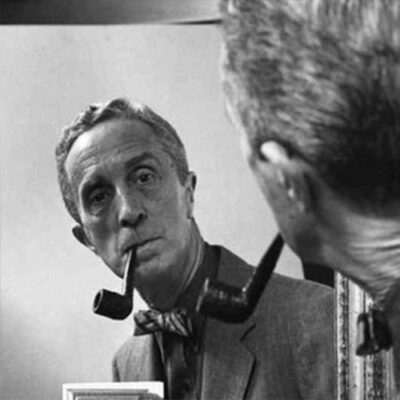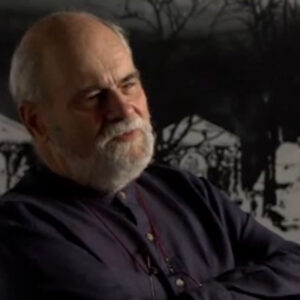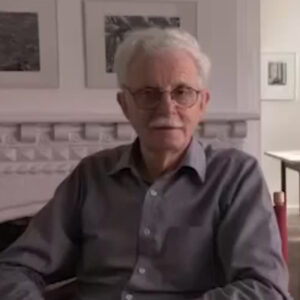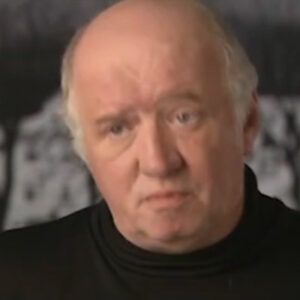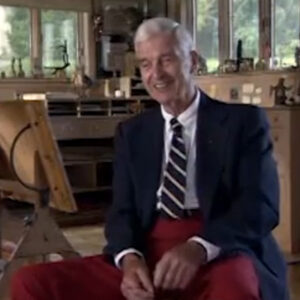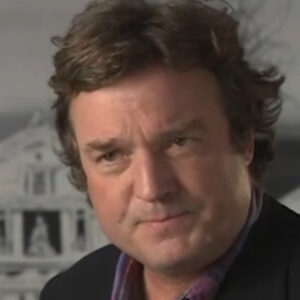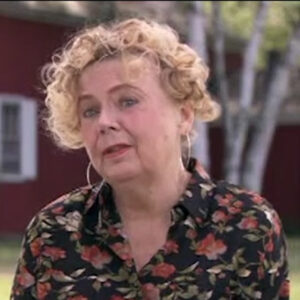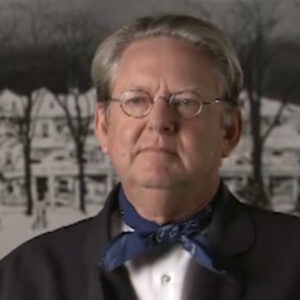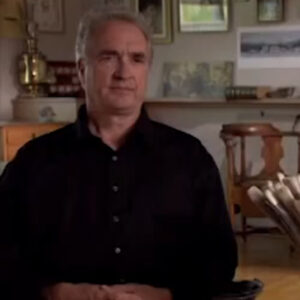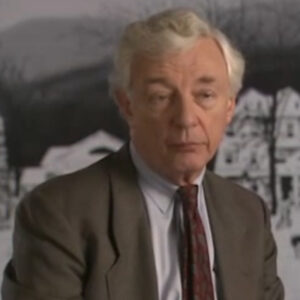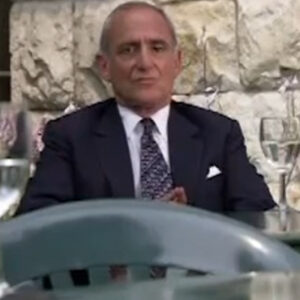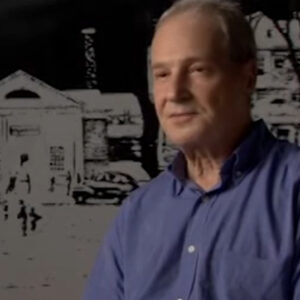Speaker Tell me about your very first memories of Rockwell images. I mean, growing up probably right.
Speaker I remember Norman Rockwell, I guess, from when I was a child. I mean, it’s interesting cause I grew up with comic books and I guess Norman Rockwell was the first serious painter illustrator that that I came to know. And I you know, I didn’t even I mean, yeah, it was Norman Rockwell had to be first. I mean, that’s what I remember most vividly.
Speaker And of course, the Saturday Evening Post had tremendous power. Right. And the role that I played on Americans culture in those days was huge. Right?
Speaker Well, it is very interesting. The Saturday Evening Post was really a cover, you know, because you don’t read all these magazines and they and in those days, we were really exposed it. It wasn’t that many subscriptions coming through. So you had newsstands and newsstands, had the Saturday Evening Post, and so you would see him every week. That was that was like the greatest art exhibit ever. If he goes if you look at that, he would go past the newsstand and you would see this this fine painting.
Speaker So you’re a big rock wall fan.
Speaker I mean, I guess that Norman Rockwell is by far one of my favorite, if not my favorite artist, because he was so much of a time in a way that people lived or we wanted them to live. And when you grew up, as I did in Brooklyn, he was my only maybe my only contact with the rest of the world outside of radio, you know. And you couldn’t see that. So he sort of told us that there was another world, that there was a Midwest. I mean, there wasn’t television. He really got along on magazines and newspapers and things like that. I mean, I learned to write from from reading the Daily News, The New York Daily News. And I guess I learned about life in the Midwest from people like Norman Rockwell.
Speaker It’s funny you say the Midwest, because in a way, it was associated with New England, too. I mean, it’s sort of ordinary American life, right?
Speaker You know, when you said really, I guess wherever you came from, you saw him from a different place.
Speaker I come from New York. And so I saw him as what the Midwest is. I’ll bet in the Midwest they thought he was New England. I’ll bet New England they thought he was California because he knew he was every place. And he was everyone. And that was his real genius that he could make. I mean, I’d never saw him as New York City.
Speaker And yet he had things with policemen and an NGO that had sort of an urban sort of a lock on those things. Small town ish. But, you know, it was it was sort of sort of a street. I, I guess I could remember every single thing, you know, you say, well, what did he do? I remember the little boy getting a haircut. I remember all those those those wonderful things. And, you know, none of them. Well, the way life really is, I guess it’s the way it life. We all want life to be.
Speaker That’s the way we would really love to live someday and never, never reach it because it’s not the way life is.
Speaker Was he kind of telling you what America was?
Speaker I mean, as a young man like.
Speaker Norman Rockwell, I guess, was as much a historian as he was a philosopher as much as he was an artist, because he really did depict this as America that we all dreamed about. I mean, I remember there was one of the during the war of men lining up to have to be inducted in the Army. So something like that, you know. And that was the way we wanted to see ourselves, you know. So he really he did something for us. He gave us a sense of ourselves that wasn’t fair. But we bought it. We bought it from the movies and we bought it. You know, we had Andy Hardy, Mickey Rooney, MGM. It was it was manufactured in Hollywood. But we believe that Andy Hardy was what Small-Town Living was. And then he also was one of these people who gave us a sense of being, who are we? What are we all about? You’ll find that in many or if any artists who really are able to capture. He was he was a photographer. He was a photographer of life.
Speaker And that’s why he was so so he became very popular. I mean, what people wanted to use them for illustrations about advertising and things like that, you know, that was the or that type. Give me a Norman Rockwell type. And that’s because he was so much better than he could give you faces. That was so much better than actors could act. You know, I kind of know and I realize now that I never saw Norman Rockwell, the man, as anything but an illustration. I never saw. I’m sure I’ve seen pictures of the man, but I don’t know if he was associate with the famous artists. A group out of out of Connecticut. So I was in the back of every comic book. You know, you two can be an artist.
Speaker Draw me. I was the only one who failed draw me.
Speaker But the fact is that e had they had pictures in back, if I remember correctly. But I never see them as a picture. I see them as an illustration. I see that. I see the pipe. I see the illustration. And I see this sort of wonderfully benevolent man who is everybody’s father or whoever one wants their father to be.
Speaker Yeah. He himself became kind of an icon or even a character, I guess you would say, sort of of America, the American character. Right.
Speaker Yeah. He became he became as probably as famous as a lot of things that people knew him. They knew Norman Rockwell. He was like he was a star. And there weren’t that many in this neighborhood where I grew up, that many artists who were seen as stars. But he was a star, you know. And that was a time when comic strips, you know, when when we got the sense of things from comic strips, which doesn’t exist really anymore. Maybe with Charlie Brown peanuts. But, you know, we used to have our captain, Dick Tracy, and it all was sort of like they were, I guess, the the heroes of my youth that everybody wanted to be a cartoonist or an illustrator of some sort. But the thing about Norman Rockwell is he really depicted an America that wasn’t there.
Speaker I mean, just in his head, you know, he just I mean, if you look at at newsreels from that time, people weren’t that way. It would take some of them were mean and hateful when they would not like people are today. But he depicted this this dream. I mean, we bought his dream. We bought this this this wonderful country where kids got wonderful little haircuts and places.
Speaker And if they cried, the benevolent barber heads them.
Speaker A lollipop policemen never frowned in Norman Rockwell paintings they never found, except if someone was doing something really bad or silly or walking across a. And then they would try to screw up their faces in a sort of a benevolent frown. But they were always happy. They were nice. You never saw there was any violence. There wasn’t any hint of violence. There never was any. It was never anything bad. I mean, you could have a painting about life in this country without any single bad thing. I mean, I don’t think he ever had a a stroke of that. There was evil. You know, all everything he painted was was beautiful. And the way we would like to live and the way we would like to think we are. And I mean, he was he could have run for president.
Speaker I think I would have voted for him.
Speaker The perfect advertiser, he was about as good an advertiser. I mean, advertising agencies love that because, I mean, they know we are selling something and we’re selling a dream. And, you know, we want to believe this is happening. You if you look at these commercials, people don’t act like they do in commercials. And there was a period of time when all the commercials had that the 10 little boys playing softball or baseball and little league and and there was had like the resident. They had five, nine blonde kids and then one black kid. Then it was like it was like so perfectly set. But his thinking was that he put everything sort of together that way. He was he he had this this fake America, which we felt fine for advertisers. Gee, you know, this is great. You know, it’s mom’s apple pie. Isn’t that great? You know, my mother made a turn. Apple pie is the truth. But the fact is that you had this sense that all mothers made made apple pie and he was a salesman. He could sell things because he had this this dream.
Speaker The minute you saw some sort of a Norman Rockwell painting or illustration, you you like, you felt good. And a lot of advertising is hoping that people will feel good about your product, about the ad. So you immediately you were winning the minute somebody turned the page and saw a Norman Rockwell painting by and it was so clear that it was Rockwell and there wasn’t anyone else. I mean, it’s very hard to knock off, I guess, because you had to have that that mindset that he had. I don’t know if there were any Rockwell imitators. There were people who I guess tried to do Rockwell but but didn’t do it well enough.
Speaker You could tell Rockwell immediately as an advertiser, as an advertiser. Other times when you have in your head a Rockwell image that you’ve, you know, replicated in some way and specific ads you can think of.
Speaker I think advertising people who make ads and I make ads for a living are probably too cynical to have a Rockwell image in their head. When they start, they get to a Rockwell image.
Speaker But I think that there’s a sort of I mean, if you’re in advertising and you’re running advertising, you really must know people. And I think that if people thought that they were selling to people who look like Rockwell people, they don’t exist.
Speaker So I think that you try to get to Rockwell, but I don’t think that anyone says, you know, I’m feeling like Norman Rockwell today. Everything is wonderful. What a great day. What a great life. Everyone is going to buy our product. I think that in the end, the selling of products is people act like salesmen. And Rockwell wasn’t a salesman. He was very he was he believed it.
Speaker I mean, salesmen sometimes don’t have to believe in whatever they’re selling. They just have to sell it. Rockwell really believed in this America that otherwise we’d never would have bought it off of his off of his pants, off of his rush. The fact is, we bought an America from him that didn’t exist. Advertisers can’t do that. It’s they they kind of know and they and there’s research that says X amount Americans and they act this way and they do this and they look at this much television, they drink this much beer. And then I think it’s sort of out of touch now. They even try to get into that Rockwell America because everything is so cutting edge and so much more harsh and serious. You did a Norman Rockwell ad right now to sell something. You know, I think you’d probably be laughed out of the advertising business because he represents a time that that that just doesn’t exist anymore. I mean, this is this is real cynicism and real edge. And maybe advertising is now has this edge of anger to it that sort of really would conflict with that. Sweet. You know what? Andy Hardy as a character, couldn’t sell, couldn’t sell things right now. There was a time in the 30s. It was very much the 30s and the 40s and 50s when, you know, there was this sort of idealism. I mean, we believed that we were as good as we told ourselves.
Speaker And we. And he told us we were good. And he told us we were kind. And he told us that we loved children. And he told us that there was no violence in the war in the world. And he told us that everything about our lives, which way we were truly the best people. We were the best people. From his from his brush in from his his pen. He said, we’re the best people. I mean, you look at you look at the children were always great. And his smile. The houses are always fantastic if there’s a maid or she’s happy. If there’s if there’s a policeman, he’s happy. The dogs are happy. Everybody’s happy. Dogs don’t bite anyone in Norman Rockwell painting. They just stand there and they look up like this and. And everybody’s happy. Just check around. But even when they’re not smiling, you know, that they lead perfect lives. We’ve come to understand now that we don’t lead perfect lives and that the people around us, even the politicians in whenever there was something where you would see somebody for a political office, he would I something. We had a white suit on and he was a flower and he was sort of speaking they were only speaking the truth. The politicians in Norman Rockwell paintings never lied. The the. Everybody was perfect. And yet we bought that. We wanted that. I mean, we might not have lived that. I mean, I was living in Brooklyn in a in a in a small house near Coney Island. Why did I think that I was as much of Norman Rockwell world as as that? Because you bought that form a lot of people. And it helped change a lot of people’s lives. I mean, in a subtle way. You got this snapshot of of of of an America that didn’t exist. Then you I guess you came up to it, you know, you believed in with him. You believed in just as you believed in radio heroes. You know, I really did believe in Hope Harrigan and Jack Armstrong and all those people. And that was that time. It was it was about heroes. It was about nice people. It was about good things. And that enabled us to fight a war with the knowledge that we’re we’re the best people and we’re going to go out and kill these bad people.
Speaker I’m sure.
Speaker Didn’t that snapshot, though, when it infiltrated into our culture to a great degree that I mean that at the time did not somehow, indirectly or subconsciously get into advertising in our home media world of our world, the advertising world.
Speaker When I first came into the business was the world of Norman Rockwell. It was the world where, you know, you wanted all sorts of good things to happen. You had all sorts of nice endings. You know, every fast food commercial consisted of of of fathers and mothers going out with their kids for a day at whatever the store at McDonald’s or Burger King or wherever we went, because that’s what that’s what life was. Now look at the same commercials and see how the world has changed. We have guys in our commercials was seven feet tall, were basketball players who then I’ll throw basketballs at each other, do something and there’s an edge and everything else. And then it ends with let’s go to McDonald’s or go to whatever. So we’ve changed we’ve changed our view. We have our heroes are no longer ordinary. People are heroes. Only sports heroes are only our only aim. We have no political heroes anymore. There are there are no heroes in this in this country except for people who could do extraordinary things, could hit people on a football field long enough to cripple them. Can can draw basketball from an amazing distance for three points. We buy these heroes who are our are the new Superman and have sort of lost the heroes who were the ordinary common folk, who were the people who were normal Rockwells people. They were the heroes. So his heroes did come into the culture. And advertising is really a mirror of what we do is we never start trends, we trends. We are afraid of trends. We do reflect whatever people are thinking. I mean, we’re chameleons. The minute someone has a new style, a new way, a new feeling.
Speaker We become that thing in advertising now is edgy and and and jittery and disjointed. And there’s handheld cameras moving around. And if you could picture what what Norman Rockwell was, it was steady and quiet and there was it.
Speaker So this that he doesn’t work in advertising anymore. We are. We’ve become what we are. You know, Judy, you know, jumping, jumbled, nervous, angry. And it’s totally different in his life, you know, nervous people in Norman Rockwell paintings. And now the world is full of people who are in analysis.
Speaker I think we have a nostalgic for his world in some way.
Speaker I, I think that having this dolgov for Norman Rockwell, I believe, is a sign of of being over 40. I think that those of us who, you know, get involved and go to bed at night watching the History Channel. And things like that, certainly long for that world. But I don’t think my 13 year old daughter. Oh, my oh, my nine year old son. Oh, my 30 year old daughter really longs for that world because they never lived in it. They never even sensed it. They never saw it. And so they might go to see a they might discover Norman Rockwell.
Speaker They might go to see one of his in an exhibit of his work. And I mean, I had this great fun Rockwell book, which is just wonderful. And I’ll go through it. But no one. None of my children. It’s certainly not my older children will ever think of thumbing through it. It’s sort of history that you might discover him one day and say, gee, you know, this Norman Rockwell, he was like, you know that guy from the other you know that that old old man.
Speaker Yeah. Yeah.
Speaker But I don’t think I think the only people who really long for it are older and have tasted it. If you haven’t tasted Norman Rockwell, it’s country. And Norman Rockwell sensibility, you don’t long for it.
Speaker You just have whatever you have going back to while back down. Can you think of any specific ad images or ads that reflect Rockwell’s world? And somebody mentioned, I think it was a pastor and that was a ripoff of freedom from want, you know, Thanksgiving dinner. Yeah. Are any specific aunts come to mind?
Speaker Everyone did something and they were you. Look at the old World War two ads. Go back to Fortune magazine in places where were all these people were trying to just advertise to tell you. And there was a boy in Pullman, number 23, which was an illustration of a guy going off to war. Very Rockwell, very, very Rockwell, everyone.
Speaker All in all, an ad when they ever they wanted to to grip and grab your heart and make you feel something they would do. Rockwell they would do a Rockwell and they would know that you would have that sense of what it was. All advertising was about. Rockwell in that time, it was about people only smile. There was no wise guy, headlines wise guy. You know, television wasn’t quick cut commercials where, you know, I think Rockwell was destroyed by MTV.
Speaker I think that that just changed the images and changed the way people saw things.
Speaker And was the you know, if if Rockwell influenced one world, MTV then influenced the next generation, who was once it came out, it was edgier and the songs were tougher and and the music was there. And now, I mean a stage where, you know, I listened to Norman Rockwell type music, but that’s that’s only when my children are not around because they hate it. They listen to, frankly, MTV and, you know, music with words that I was afraid to use in front of my family.
Speaker But now they listen to it.
Speaker Someone sings these songs and they play them on their. So you couldn’t do a lot of the things that the Iraq war was perfect for. That time was perfect for that time. We were at war. We’re going to war. We were threatened. And yet we always wanted to be good people and we had good thoughts. We really loved our politicians. You know, this was a sense of our politicians were were our heroes.
Speaker FDR, who was probably through most of of of Rockwells, was president through most of Rockwell’s time, was loved. Harry Truman was was disliked by many people politically, but he was small town America. Good man. Independence, Missouri.
Speaker Dwight Eisenhower was a good me, you know, a good man Jack Kennedy loved.
Speaker And then after that, I think that November 22nd, we all got cynical, we all went crazy, and the world changed and will change. And Norman Rockwell’s world.
Speaker Couldn’t follow it. Couldn’t be happy anymore.
Speaker Now, even though he tried to his work did change a lot on the six days.
Speaker But but he, Rockwell couldn’t be couldn’t do angry work. You know, he couldn’t do even if he could try. He couldn’t do people angry. Fighting authority. He was about authority. He was about people listening to their president and their politicians and doing what they want. Going off to the army, doing whatever it was. It was it was much more. We were naive. It was a naive sort of simple, because I’m sure that this is these people who are our heroes then haven’t changed all that much. I think we just saw them drive away. Media changed. You know, that’s the thing around a Saturday Evening Post went out of business. You know why? Because Rockwell and everything just sort of changed. And they didn’t change with it. Couldn’t in the case of Rockwell, anything he could change with it. I don’t think that you know, I can’t see Rockwell turning into Jules Feiffer head.
Speaker And nor can I say Jules Feiffer turning into Rockwell.
Speaker Do you have a favorite Rockwell moment? Oh, I loved it. I always my favorite Rockwell was always the boy getting the haircut. I always loved the the Thanksgiving dinner stuff because I had a Thanksgiving dinner like that. But I imagined I was having that kind of it was time to eat turkey. The fact is that, you know, you would look at this, at this, at this and say, gee, that’s the way people live. That’s not wonderful. Grandma has the turkey. Everybody is smiling. They’re all standing there with their knives and forks poised. Everybody is so well-behaved. Yeah, those those are my favorite. But they were all my favorite. Jenna Rockwell is one person.
Speaker I have never seen a Rockwell illustration of painting that I didn’t like. And I don’t think anyone has thought to have a favorite. When is that? When you don’t have any that you say. It’s not real. I don’t like that at all. They all get this. This is a man who had a magic carpet that was taking pictures of an America that didn’t exist and then publishing and doing it. And the thing about him is he was so good with just a little smile, little expression could do facial expressions that actors couldn’t do. You know, you could not get an actor. You could if I said, does it let me do a Norman Rockwell ad. But I want to use real life actors and models. It would be a disaster. Think of it. Think think of it. The grandmother holding holding the turkey. Yeah. It would be horrible if you used because he made people look better than they did. Then they really looked him. They gave them an expression that they may not have.
Speaker It was he was he was a master.
Speaker Somebody said that freedom from want us has. It’s like a religious image.
Speaker You know, it’s like, oh, there was a lot of know. There was a sense of there was a great sense of religion in his work. There was a great sense of believing in it. I mean, there was God was everything about him. Interesting. I don’t know anyone. It would be interesting to people my age and even younger.
Speaker And Jay, what is your least favorite, Norman Rockwell? And you would probably you’d get blank stares. You get blank stares. Who is the least favorite?
Speaker Do you own any of your collected.
Speaker No. No, I could. I when I when I loved them, I could barely afford the Saturday Evening Post. So I didn’t know any. I never owned a rock. Well, and then when they could afford it, they were all gone or too expensive.
Speaker That Fehlberg of course. But collector. A lot of people drawn analogies in a way between his films and Rockwell imagery. Is that anything that strikes you?
Speaker Well, there are a lot of you know, if you remember, I guess 80 and that that you know that.
Speaker Do you think of think of that family and that sort of sense of the little girl and little boy and their their reaction?
Speaker Yeah, I can get a lot of I get a lot of how Spielberg was influenced by him and his being such a master at being able to do that and put that together that way. I would think a lot of moviemakers, you know, I would imagine a lot of movie makers were influenced by him because he had, you know, certainly the the MGM lot where, you know, Louis B. Mayor was sort of like I thought he was like Norman Rockwell of movies and only wanted good wholesome.
Speaker I love that good wholesome thing. You know, in Hollywood, some people were not good and wholesome, made some wonderful good and also movies. And, you know, certainly the James Stewart It’s a Wonderful Life was Rockwell as Rockwell.
Speaker You know, this guy who has an angel, the benevolent angel who follows him, has all these friends. Look at the last scene of It’s a Wonderful Life where all of his friends are around them. He’s holding his little daughter. They’re touching the Christmas tree because another angel is going to be made. Clarets is going to and suddenly turn it into a Rockwell painting.
Speaker And you can see exactly how it would look. The nice policeman, the driver brings it back Sunday. Everyone loves George Bailey. It’s Rockwell. All right. Frank Capra as a director, did Rockwell Frank Capra had this sense of. But again, he was doing Rockwell and Rockwell was doing. It wasn’t Rockwell doing Capra’s character doing Rockwell.
Speaker You said that there’s no rock. There’s one more question. You said there’s no rock on advertising today. And I have to say, sometimes I think I see like I’m thinking of a I think it was a Pepsi ad I saw recently of a little girl at a diner or a soda counter, you know, some way. I had that sort of lighting reminiscent of Rockwell. I mean, do you think that ever of something infiltrates through.
Speaker Occasionally. Sure. Occasionally. I know a lot of the people who do Pepsi advertising, and it’s interesting, they are all over 50 years old. So you might see a little Rockwell in in the Pepsi advertising because they have to you have to be that age to have that sensibility and say, let me try that and hope that the client is also over 50.

